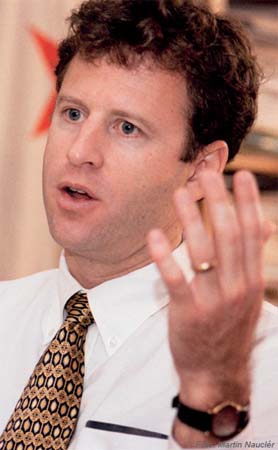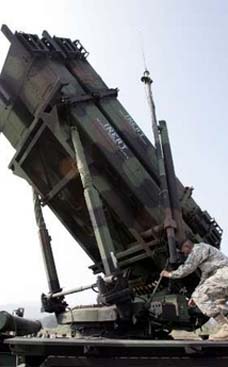2006.11.09: November 9, 2006: Headlines: COS - Congo Kinshasa: Foreign Policy: Brookings Institute: Iraq: Washington Times: Michael O'Hanlon writes: While control of the Congress does not always have a huge bearing on foreign policy, it could matter greatly for our effort in Iraq
Peace Corps Online:
Directory:
Congo - Kinshasa (Zaire):
Special Report: National Security Expert and Congo Kinshasa RPCV Michael O'Hanlon:
2006.11.09: November 9, 2006: Headlines: COS - Congo Kinshasa: Foreign Policy: Brookings Institute: Iraq: Washington Times: Michael O'Hanlon writes: While control of the Congress does not always have a huge bearing on foreign policy, it could matter greatly for our effort in Iraq
Michael O'Hanlon writes: While control of the Congress does not always have a huge bearing on foreign policy, it could matter greatly for our effort in Iraq

"The Iraqi government is failing to make tough decisions to unify the country. The Shia-dominated coalition has refused to promise to share oil revenue equally with Sunni Arabs. It has resisted rehabilitating former low-level Ba'athists so they can regain lost jobs and re-enter public life. It has let the militias operate with increasing impunity. It is not trying to build a new Iraq so much as protect its own sectarian interests. As we have seen throughout 2006, this is a prescription not for peace but for civil war. And it is entirely inappropriate that American GIs should keep dying while Iraqi politicians do such a poor job of running their own country. " Michael O'Hanlon, a Senior Fellow at the Brookings Institute and a Visiting Lecturer at Princeton University, served as a Peace Corps Volunteer in Congo Kinshasa.
Michael O'Hanlon writes: While control of the Congress does not always have a huge bearing on foreign policy, it could matter greatly for our effort in Iraq
Bad cop, good cop?
By Michael O'Hanlon
November 9, 2006
The world has just changed. While control of the Congress does not always have a huge bearing on foreign policy, it could matter greatly for our effort in Iraq. Congress was central in forcing the United States out of Vietnam in the early 1970s, and more recently it obliged President Clinton to leave Somalia quickly in 1994. Its power of the purse, and in particular its central role in fashioning the defense budget, mean presidents cannot sustain losing war efforts indefinitely absent congressional support.
What does this mean for American policy in Iraq? Based on the last months and years of sparring between the parties on the issue, it is hard to be optimistic about the ability of President Bush and incoming House Speaker Nancy Pelosi to cooperate for the greater national good. After a fall election campaign, in which the president often spoke of his opponents as Defeatocrats and the party of cut and run, and Democrats mocked the president for his claim "we're winning" and his recent statement he was "pleased" with how things are going in Iraq, one shudders to think of how the two parties will interact on this matter of grave national significance when the 110th Congress takes office next year.
[Excerpt]
...Mrs. Pelosi and Mr. Bush could consider working together -- or at least putting off the hard-core fight on Iraq until 2008. They could try to make a virtue of necessity. They could agree to issue an ultimatum of sorts to the Iraqi government, backed up by the political reality of the recent Democratic triumph in the House. The point would not be to impose our will on another sovereign nation. Rather, the message to Baghdad would be that America will not indefinitely spend its treasure and sacrifice the lives of its sons and daughters for a war that is being lost.
The Iraqi government is failing to make tough decisions to unify the country. The Shia-dominated coalition has refused to promise to share oil revenue equally with Sunni Arabs. It has resisted rehabilitating former low-level Ba'athists so they can regain lost jobs and re-enter public life. It has let the militias operate with increasing impunity. It is not trying to build a new Iraq so much as protect its own sectarian interests. As we have seen throughout 2006, this is a prescription not for peace but for civil war. And it is entirely inappropriate that American GIs should keep dying while Iraqi politicians do such a poor job of running their own country.
President Bush should tell Prime Minister Nouri al-Maliki that, however much he might want to, he cannot sustain the American public's commitment to this war unless the situation improves fast. Portraying himself as the good cop, he can tell our Iraqi friends that the "bad cop" of the Democratic Congress will increasingly tie his hands, and that an antiwar Democrat (or even an antiwar Republican) may succeed him in the White House in 2009 unless things improve quickly.
Absent greater cooperation from Baghdad, America's commitment to the Iraq project will soon wane. As tough as this message would be to deliver, it could be sweetened somewhat with a new inducement, such as a pledge of American support to help fund an overdue job-creation program for Iraq's large unemployed population.
Mr. Bush will not want to do this, given that he has staked his presidency on the outcome in Iraq. But American political reality will soon give him little choice. That makes any ultimatum from him much more credible than it would have been before Tuesday's election. Similarly, Mrs. Pelosi, as speaker, may not want to support Mr. Bush's plan for Iraq and sustain large numbers of American troops there much longer, regardless of what Iraq's government chooses to do. But in the interest of trying to win the war, and trying to avoid a further tarnishing of the Democratic Party as the party of defeatism (however undeserved that label may be), she may be willing to cooperate.
The hour is late in Iraq. But we still have one more chance, if we are wise enough to rise above our differences and divisions at home and seize the opportunity.
Michael O'Hanlon is senior fellow at the Brookings Institution and coauthor with Kurt Campbell of "Hard Power: The New Politics of National Security."
Links to Related Topics (Tags):
Headlines: November, 2006; RPCV Michael O'Hanlon (Congo Kinshasa); COS - Congo Kinshasa; Iraq
When this story was posted in November 2006, this was on the front page of PCOL:





Peace Corps Online The Independent News Forum serving Returned Peace Corps Volunteers
 | Harris Wofford to speak at "PC History" series
Senator Harris Wofford will be the speaker at the 4th Annual "Peace Corps History" series on November 16 sponsored by the University of Maryland at Baltimore County (UMBC) and the Maryland Returned Volunteers. Previous speakers in the series have included Jack Vaughn (Second Director of the Peace Corps), Scott Stossel (Biographer of Sargent Shriver), and C. Payne Lucas (President Emeritus of Africare). Details on the time and location of the event are available here. |
 | Chris Dodd's Vision for the Peace Corps
Senator Chris Dodd (RPCV Dominican Republic) spoke at the ceremony for this year's Shriver Award and elaborated on issues he raised at Ron Tschetter's hearings. Dodd plans to introduce legislation that may include: setting aside a portion of Peace Corps' budget as seed money for demonstration projects and third goal activities (after adjusting the annual budget upward to accommodate the added expense), more volunteer input into Peace Corps operations, removing medical, healthcare and tax impediments that discourage older volunteers, providing more transparency in the medical screening and appeals process, a more comprehensive health safety net for recently-returned volunteers, and authorizing volunteers to accept, under certain circumstances, private donations to support their development projects. He plans to circulate draft legislation for review to members of the Peace Corps community and welcomes RPCV comments. |
 | He served with honor
One year ago, Staff Sgt. Robert J. Paul (RPCV Kenya) carried on an ongoing dialog on this website on the military and the peace corps and his role as a member of a Civil Affairs Team in Iraq and Afghanistan. We have just received a report that Sargeant Paul has been killed by a car bomb in Kabul. Words cannot express our feeling of loss for this tremendous injury to the entire RPCV community. Most of us didn't know him personally but we knew him from his words. Our thoughts go out to his family and friends. He was one of ours and he served with honor. |
 | Peace Corps' Screening and Medical Clearance
The purpose of Peace Corps' screening and medical clearance process is to ensure safe accommodation for applicants and minimize undue risk exposure for volunteers to allow PCVS to complete their service without compromising their entry health status. To further these goals, PCOL has obtained a copy of the Peace Corps Screening Guidelines Manual through the Freedom of Information Act (FOIA) and has posted it in the "Peace Corps Library." Applicants and Medical Professionals (especially those who have already served as volunteers) are urged to review the guidelines and leave their comments and suggestions. Then read the story of one RPCV's journey through medical screening and his suggestions for changes to the process. |
 | The Peace Corps is "fashionable" again
The LA Times says that "the Peace Corps is booming again and "It's hard to know exactly what's behind the resurgence." PCOL Comment: Since the founding of the Peace Corps 45 years ago, Americans have answered Kennedy's call: "Ask not what your country can do for you--ask what you can do for your country. My fellow citizens of the world: ask not what America will do for you, but what together we can do for the freedom of man." Over 182,000 have served. Another 200,000 have applied and been unable to serve because of lack of Congressional funding. The Peace Corps has never gone out of fashion. It's Congress that hasn't been keeping pace. |
 | PCOL readership increases 100%
Monthly readership on "Peace Corps Online" has increased in the past twelve months to 350,000 visitors - over eleven thousand every day - a 100% increase since this time last year. Thanks again, RPCVs and Friends of the Peace Corps, for making PCOL your source of information for the Peace Corps community. And thanks for supporting the Peace Corps Library and History of the Peace Corps. Stay tuned, the best is yet to come. |
 | History of the Peace Corps
PCOL is proud to announce that Phase One of the "History of the Peace Corps" is now available online. This installment includes over 5,000 pages of primary source documents from the archives of the Peace Corps including every issue of "Peace Corps News," "Peace Corps Times," "Peace Corps Volunteer," "Action Update," and every annual report of the Peace Corps to Congress since 1961. "Ask Not" is an ongoing project. Read how you can help. |
Read the stories and leave your comments.

Some postings on Peace Corps Online are provided to the individual members of this group without permission of the copyright owner for the non-profit purposes of criticism, comment, education, scholarship, and research under the "Fair Use" provisions of U.S. Government copyright laws and they may not be distributed further without permission of the copyright owner. Peace Corps Online does not vouch for the accuracy of the content of the postings, which is the sole responsibility of the copyright holder.
Story Source: Washington Times
This story has been posted in the following forums: : Headlines; COS - Congo Kinshasa; Foreign Policy; Brookings Institute; Iraq
PCOL35146
37

















